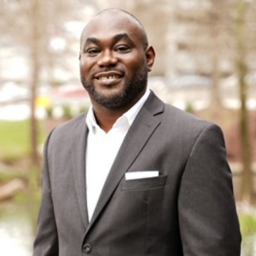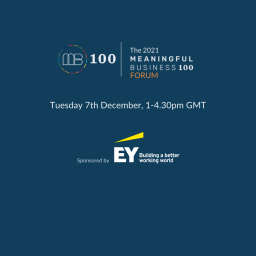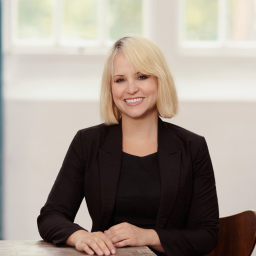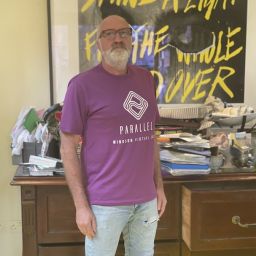Meaningful Business (MB:) What exactly is Justice Reskill?
Aaron Clark (AC): Justice Reskill is a social enterprise that equips justice-involved individuals with the skills, resources, and connections needed to achieve lasting career success in tech and related high-wage industries. We are committed to this work because there’s a great need to reform the American criminal justice system, and we think we’re in a unique position to do so through workforce development.
By giving folks true hope and opportunity, we can truly change their lives and the lives of their family. We’ll then have an empowered population of justice-involved leaders, who can in turn change our world and continue to address some of these bigger systemic issues.
MB: Was there a particular experience that inspired you to set it up?
AC: Justice Reskill has been a concept inside of me for over a decade. As a technologist, I have always struggled with the inequity that exists in this field and have been inspired to find solutions. But the “validation” I needed happened about three years ago, when I was at an event that was 100% underrepresented folks in tech. After throwing out the idea of providing a pathway for justice-involved folks to get into tech, everyone began to share their stories of either direct involvement with the justice system or a close friend’s or family member’s story. These people all expressed a strong desire to see Justice Reskill become a reality.
MB: Why do you think it’s so important that we help previously incarcerated people rejoin the workforce?
AC: We believe in fair chances. Many underserved people in our society were not given the kind of opportunities that could have shaped their lives for professional and economic success. They have since been overlooked, discriminated against, and forced to survive in a system that too often strips them of their agency. These people have already paid their debt to society, yet in many cases, the obstacles they face after release are just as punitive as their legal sentences.
By contrast, when justice-involved folks are part of the middle to upper levels of the workforce, they are able to enjoy some of the benefits of power and privilege. In our view, this is the true “equity” that DEI (diversity, equity, and inclusion) efforts should attempt to create.
In addition to our reskilling programs, we’ve also recently launched the Fair Chance Hiring Platform, a collaborative effort to reduce recidivism, increase public safety, and create more jobs by employing justice-involved individuals across the State of Colorado and beyond. With programmes like these, we think we can remove some of these existing barriers and start to accelerate the progress of the justice-involved community.
MB: How has the ongoing pandemic affected your work?
AC: Though data still remains scarce, every statistic that we see shows that the COVID pandemic has disproportionately affected BIPOC communities. We know that justice-involved communities are mostly BIPOC (as many as 60% of the prison population, according to the Prison Policy Initiative), and the longstanding barriers to stable employment facing the justice-involved individuals across the country have only been exacerbated by the high overall unemployment rates caused by COVID. We therefore feel our work is needed more than ever.
Now, as we are heading into a period of recovery, we have to prepare workers for highly skilled roles. Jobs that pay below a living wage will not be sufficient to help justice-involved folks. We also see things like rental debt skyrocketing during the pandemic. The Federal Reserve Bank of Philadelphia recently reported that “1.8 million renter households, representing 5 million individuals, will owe $11 billion in rent — approximately $6,100 per household.” We cannot depend on social programmes to cover all of the needs of our community. Better employment opportunities have to be a part of the solution.
MB: Why should employing justice-impacted individuals form a core part of businesses’ DEI strategy?
AC: DEI efforts aim to hire and elevate BIPOC individuals. For most companies, this requires an increased level of cultural competency and intentional strategies that address bias and discrimination. Hiring justice-involved individuals fits within this overall strategy, because it asks each person at a company to address their own inherent and often unfactual biases about another human.
We also believe that as companies look to diversify their workforce, BIPOC communities are also wary of companies’ performative gestures – like public statements that are not backed up by real equitable practices within the company. Creating a fair chance hiring policy is a clear sign that the company and its leadership are willing to have the hard conversations necessary to create a psychologically safe space for BIPOC communities.
As we mentioned before, people of colour tend to be disproportionately affected by the justice system. By opening a company’s doors to the justice-involved community, you’re also broadening the pool of qualified BIPOC employees that can be considered.
Aaron Clark, Founder, Justice Reskill
MB: What insights would you share with businesses looking to hire formerly incarcerated people?
AC: Beyond the clear moral case for why a company should actively engage in fair chance hiring, there is an enormous economic case for any business that wants to see better employee engagement and growth in their bottom line.
Data is hard to come by to track the success of fair chance hiring programs but where it does exist, it supports the success of organisations who hire justice-involved folks, which have seen lower turnover and higher productivity. In 2016, John Hopkins Medical Center released survey results following 5 years of hiring almost 500 justice-involved folks and found:
- A lower turnover for the first 40 months vs. other hires
- Of the 79 folks with serious records, 73 were still employed at the end of the study and only 1 was terminated involuntarily
- No problematic terminations during the time period were justice-involved folks
For companies that are not actively engaging in FCH, we suggest:
-
- Start by doing research and reading to understand the concept of fair chance hiring. We’ve created a fact sheet here (https://bit.ly/About-FCH) and a resource toolkit here (http://bit.ly/FCH-Toolkit) to get you started.
- Have conversations with other employers in your area or industry that are engaging in fair chance hiring and with local reentry organisations. These folks are often ready to help companies engage in fair chance hiring. If you need some connections, reach out to us on our website here (https://fairchancehiring.co)!
- Open up the dialogue around FCH with your team. Listen to the perspectives from the folks on your team. If possible, invite a community partner working in the reentry space to help facilitate this conversation.
- Set a goal for fair chance hiring during the current year and the upcoming year. This could be a number of hires or a percentage of hires.
- And when you hit a point where help is needed, reach out to an organization like our Fair Chance Hiring Platform. Most folks in this space are ready to support the growth of your company’s fair chance hiring strategy.
MB: What does the future hold for Justice Reskill?
AC: We are addressing a huge and enduring issue in our society, so we will continue to do what’s required to build a path of true economic stability for justice-involved people. Through our programs and our advocacy work, we will continue to build a community of justice-involved leaders in the workplace, who can overturn damaging misperceptions and cultivate a greater sense of belonging and representation for justice-involved individuals around the country.
Within our organisation, we are adding to our core Software Engineering learning track and launching new learning tracks to include in-demand skills in Sales Development, Technical Recruiting, Customer Experience (CX), Data Science, Mobile Application, UI/UX, and Project Management. Post-COVID, we also plan to offer in person learning in Colorado, and later this year, we will launch an online learning platform for anyone justice-involved across the country to begin their journey into economically stable technology careers. Finally, we hope to launch new partnerships in key states across the US, including a new program with the Anti-Recidivism Coalition in California.
______
TO JOIN Aaron Clark in The reimagining justice COMMUNITY, APPLY TO BECOME A MEMBER OF MEANINGFUL BUSINESS HERE





















